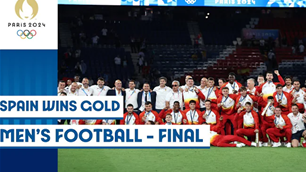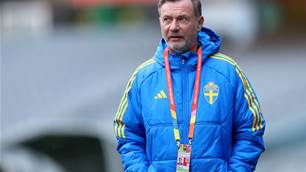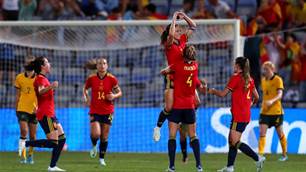FOREWARNED proved not to be forearmed for the rest of the planet as Spain's classy pass masters overcame all challenges to add a first-ever World Cup title to their European crown.
The so-called 'tiki-taka' style of fluid ball circulation and probing touch football that swept Vicente Del Bosque's side to glory in South Africa has been the backbone of both Spain and Barcelona's domination in recent years and should not have caught any team unawares this summer.
However, as scores of club and national sides have found out to their cost, knowing what to expect and then knowing how to counter it are two very different things.
Opposition tactics varied as they sought to find the magic winning formula, be it a physical approach, looking to take the game to the Spanish or getting men behind the ball and hitting them on the break, but Del Bosque's richly-talented squad ultimately had an answer to every question they were posed.
One of the hardest tasks Spain had to face at the World Cup was overcoming the shock of losing their opening match to Switzerland .
The Iberian nation were the last of the 32 participants to arrive in South Africa and they looked in serious danger of being one of the first to leave after the Swiss caused the first major upset of the event when they inflicted only Spain's second defeat in 49 games in the first round of matches in Group H.
That 1-0 win in Durban, which saw Switzerland opt to sit back and hit their opponents on the counter-attack, immediately raised a number of question marks about Spain's ability to live up to their tag of pre-tournament favourites.
Could Spain do any better and avoid an embarrassing early exit if the other sides in Group H, Honduras and Chile, employed similar tactics? Were Spain's 'golden generation' being weighed down by the huge expectations on their shoulders and the ghosts of national failures in past World Cups? Had the bubble burst?
After more than three years of almost constant success and plaudits, the Spanish were seeing life from a different perspective.
Former coach Luis Aragones, the man who led them to glory at Euro 2008, was critical of the team's performances and tactics in the Switzerland game, while rival nations will have been buoyed by the knowledge that no country had ever won the World Cup after losing their opening match.
Remarkably, the hugely successful Del Bosque also found himself under the spotlight, leading to RFEF president Angel Maria Villar assuring the former Real Madrid coach's job was safe even if the team failed to reach the last 16.
Inside the Spain camp though, which included around three-quarters of the squad that conquered Europe two years previously, the mood remained determined and defiant, with no thoughts of sacrificing the patient passing game that had been serving them so well.
It was a setback yes, and one that left little room for manoeuvre, but it was not a bad performance by Del Bosque's men and in hindsight turned out to be something of a blessing in disguise.
"That first stumble versus Switzerland has been highly motivating psychologically," Del Bosque said prior to their last 16 meeting with Portugal.
"I don't think we had to learn any lessons, though, because this group is very humble and modest. We were not floating along on cloud nine at all, we fully realise that every match is difficult in itself."
Having suffered a losing start to the World Cup, Spain needed a quick response and they did so in their next match as they recorded a one-sided 2-0 win over Honduras.
However, that match also showed arguably Spain's biggest weakness - an inability to make the most of the plethora of goalscoring opportunities and promising attacking positions they create for themselves.
Fortunately for Del Bosque's men though, that did not prove costly and as the tournament progressed they became increasingly assured in their performances.
The seemingly telepathic Barca midfield duo of Xavi and Andres Iniesta, as usual, could be found at the heart of much of Spain's best work, and they were given freedom to strut their stuff by the use of two holding midfielders in Xabi Alonso and Sergio Busquets.
Up front David Villa, one of seven Barcelona men in Spain's World Cup final starting line-up, took up the slack caused by the struggles of Fernando Torres to continue his remarkable scoring run for his country.
The former Valencia hitman finished the competition as the joint lead scorer with five goals, along with Thomas Muller, Wesley Sneijder and Diego Forlan, and is now just one away from equalling Raul's Spanish record of 44.
At the back, Sergio Ramos looked near his best as a marauding right-back and was also part of a defence that dominated to such an extent that Spain were able to finish as the lowest-scoring World Cup winners in history.
Spain struck just eight times in their seven matches, winning each of their four knockout games 1-0 culminating in last night's late victory over Holland in Soccer City.
Few could argue that Spain did not deserve to claim their maiden world title and, what will be of some concern for rival nations, is that this could be the start of a dynasty rather than a one-off.
Of Del Bosque's 23-man squad for this World Cup, only a handful are unlikely to be around to defend their title in four years' time, while players such as Cesc Fabregas, David Silva, Busquets, Pedro Rodriguez, Gerard Pique and Juan Manuel Mata are still in their early 20s and could still be fixtures in 2018.
That is yet more food for thought for opposing sides, who will already need to return to the drawing board after this World Cup to try to find a way to stop the current 'golden generation' of Spanish football.
However, as scores of club and national sides have found out to their cost, knowing what to expect and then knowing how to counter it are two very different things.
Opposition tactics varied as they sought to find the magic winning formula, be it a physical approach, looking to take the game to the Spanish or getting men behind the ball and hitting them on the break, but Del Bosque's richly-talented squad ultimately had an answer to every question they were posed.
One of the hardest tasks Spain had to face at the World Cup was overcoming the shock of losing their opening match to Switzerland .
The Iberian nation were the last of the 32 participants to arrive in South Africa and they looked in serious danger of being one of the first to leave after the Swiss caused the first major upset of the event when they inflicted only Spain's second defeat in 49 games in the first round of matches in Group H.
That 1-0 win in Durban, which saw Switzerland opt to sit back and hit their opponents on the counter-attack, immediately raised a number of question marks about Spain's ability to live up to their tag of pre-tournament favourites.
Could Spain do any better and avoid an embarrassing early exit if the other sides in Group H, Honduras and Chile, employed similar tactics? Were Spain's 'golden generation' being weighed down by the huge expectations on their shoulders and the ghosts of national failures in past World Cups? Had the bubble burst?
After more than three years of almost constant success and plaudits, the Spanish were seeing life from a different perspective.
Former coach Luis Aragones, the man who led them to glory at Euro 2008, was critical of the team's performances and tactics in the Switzerland game, while rival nations will have been buoyed by the knowledge that no country had ever won the World Cup after losing their opening match.
Remarkably, the hugely successful Del Bosque also found himself under the spotlight, leading to RFEF president Angel Maria Villar assuring the former Real Madrid coach's job was safe even if the team failed to reach the last 16.
Inside the Spain camp though, which included around three-quarters of the squad that conquered Europe two years previously, the mood remained determined and defiant, with no thoughts of sacrificing the patient passing game that had been serving them so well.
It was a setback yes, and one that left little room for manoeuvre, but it was not a bad performance by Del Bosque's men and in hindsight turned out to be something of a blessing in disguise.
"That first stumble versus Switzerland has been highly motivating psychologically," Del Bosque said prior to their last 16 meeting with Portugal.
"I don't think we had to learn any lessons, though, because this group is very humble and modest. We were not floating along on cloud nine at all, we fully realise that every match is difficult in itself."
Having suffered a losing start to the World Cup, Spain needed a quick response and they did so in their next match as they recorded a one-sided 2-0 win over Honduras.
However, that match also showed arguably Spain's biggest weakness - an inability to make the most of the plethora of goalscoring opportunities and promising attacking positions they create for themselves.
Fortunately for Del Bosque's men though, that did not prove costly and as the tournament progressed they became increasingly assured in their performances.
The seemingly telepathic Barca midfield duo of Xavi and Andres Iniesta, as usual, could be found at the heart of much of Spain's best work, and they were given freedom to strut their stuff by the use of two holding midfielders in Xabi Alonso and Sergio Busquets.
Up front David Villa, one of seven Barcelona men in Spain's World Cup final starting line-up, took up the slack caused by the struggles of Fernando Torres to continue his remarkable scoring run for his country.
The former Valencia hitman finished the competition as the joint lead scorer with five goals, along with Thomas Muller, Wesley Sneijder and Diego Forlan, and is now just one away from equalling Raul's Spanish record of 44.
At the back, Sergio Ramos looked near his best as a marauding right-back and was also part of a defence that dominated to such an extent that Spain were able to finish as the lowest-scoring World Cup winners in history.
Spain struck just eight times in their seven matches, winning each of their four knockout games 1-0 culminating in last night's late victory over Holland in Soccer City.
Few could argue that Spain did not deserve to claim their maiden world title and, what will be of some concern for rival nations, is that this could be the start of a dynasty rather than a one-off.
Of Del Bosque's 23-man squad for this World Cup, only a handful are unlikely to be around to defend their title in four years' time, while players such as Cesc Fabregas, David Silva, Busquets, Pedro Rodriguez, Gerard Pique and Juan Manuel Mata are still in their early 20s and could still be fixtures in 2018.
That is yet more food for thought for opposing sides, who will already need to return to the drawing board after this World Cup to try to find a way to stop the current 'golden generation' of Spanish football.
Copyright (c) Press Association
Related Articles

Spain complete golden summer with victory over France

Spain, Sweden set for high pressure World Cup semi













